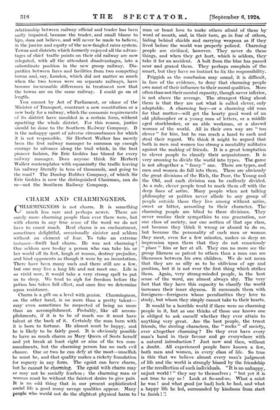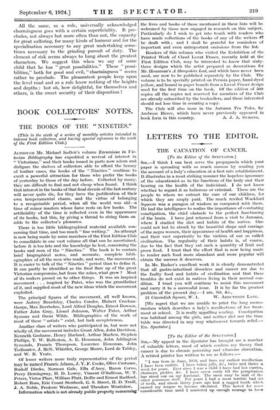CHARM AND CHARMINGNESS.
CHARMINGNESS is not charm. It is something much less rare and perhaps newer. There are surely more charming people than ever there were, but with charm in any true sense of the word we do not have to count much. Real charm is an enchantment, sometimes delightful, occasionally sinister and seldom without an element of fear. To take an extreme instance—Swift had charm. He was not charming ! One seldom sees to-day a person who can take his or her world off its feet, laugh at reason, destroy prejudice, and bind opponents as though it were by an incantation. There have been many such and there still are a few, but one may live a long life and not meet one. Life is so vivid now, it would take a very strong spell to put us to sleep. We tend to sigh for freedom before the potion has taken full effect, and once free we determine upon resistance. Charm is a gift on a level with genius. Charmingness, on the other hand, is no more than a pretty talent— may • even sometimes be suspected of being no more than an accomplishment. Probably, like all accom- plishments, if it is to be of much use it must have talent at the back of it. Certainly the man born with it is born to fortune. He almost must be happy, and he is likely to be fairly good. It is obviously possible to have as much charm as Mary Queen of Scots herself and yet break at least eight or nine of the ten com- mandments, but the charming person has no such evil chance. One or two he can defy at the most—unselfish he must be, and that quality makes a rickety foundation for roguery in any form. The egoist can have charm, but he cannot be charming. The egoist with charm may or may not be socially fearless ; the charming man or woman must be without the faintest desire to give pain It is an odd thing that in our present sophisticated social life a good many savage qualities appear. Many people who would not do the slightest physical harm to man or beast love to make others afraid of them by word of mouth, and, in their turn, go in fear of others, hiding behind shields and carrying weapons as if they lived before the world was properly policed. Charming people are civilized, however. They never do these things, and when they get hurt, which is seldom, they take it for an accident. A bolt from the blue has passed near and grazed them. They perhaps complain of the smart, but they have no instinct to fix the responsibility.
Priggish as the conclusion may sound, it is difficult, in face of the evidence, to deny that charming people owe most of their influence to their moral qualities. More often than not their mental capacity, though never inferior, is not above the average. The strangest thing about them is that they are not what is called clever, only adaptable. A charming boy—or a charming old man for that matter—will get the hearty good word of an old philosopher or a young man of letters, or a middle aged stockbroker, or an able workman, or a shrewd woman of the world. All in their own way are " too clever " for him, but he can reach a hand to each and steal their regard. We think it might be argued that both in men and women too strong a mentality militates: against the making of friends. It is a great temptation to clever people to classify their acquaintance. It is very amusing to divide the world into types. The game is not altogether a " fancy " one. There are types, and men and women do fall into them. There are obviously the great divisions of the Rich, the Poor, the Young and the Old, and each division can be endlessly divided. As a rule, clever people tend to mark them off with the deep lines of satire. Many people when not talking philosophy or politics never allude to any group of people outside those they live among without satire,. sweet or bitter, according to their character. The; charming people are blind to these divisions. They never confine their sympathies to one generation, nor one class of society, nor one section of that one class, not because they think it wrong or absurd to do so, but because the personality of each man or woman they meet, even for a few minutes, makes so deep an impression upon them that they do not consciously place " him or her at all. They can no more see the group likeness so patent to others than a man can see likenesses between his own children. We do not mean that they are so silly as to be oblivious of age and position, but it is not ever the first thing which strikes them. Again, very strong-minded people, in the best sense of the word, are almost always shy. The very fact that they have this capacity to 'classify the world' increases their inner shyness. It surrounds them with foreigners—foreigners whose peculiarities they love to. study, but whom they simply cannot take to their hearts.
It would be a horrible world if there were no charming people in it, but as one thinks of those one knows one is obliged to ask oneself whether they ever attain to anything very great. Are the best people, the truest friends, the sterling characters, the " rocks " of society, ever altogether charming ? Do they ever have every man's hand in their favour and go everywhere with; a natural introduction ? Just now and then, without a doubt. All experienced people have known a few, , both men and -women, in every class of life. So true is this that we believe almost every man's judgment of, life and the world is strongly biased by the friendship or the recollection of such individuals. "It is 'an unhappy, unjust -world !" they say to themselves ; " but yet it is not true to say so I Look at So-and-so. What a saint he was ! and what ,good (or bad) luck he had, and what a happy life he led, surrounded by kindness from start to finish ! All the same, as a rule, universally acknowledged charmingness goes with a certain superficiality. It pre- cludes, not always -but more often than not, the capacity for great suffering, for many kinds of humour and for the specialization necessary to any great undertaking some- times necessary to the grinding pursuit of duty. The element of risk seems always to hang about the greatest characters. We suggest this when we say of some child that he has " great possibilities." These " possi- bilities," both for good and evil, " charmingness " seems rather to preclude. The pleasantest people keep upon the level road and as a rule know nothing of the heights and depths ; but oh, how delightful, for themselves and others, is the sweet security of their disposition I







































 Previous page
Previous page